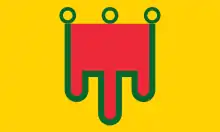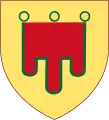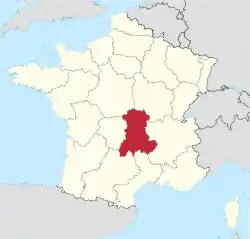Auvergne (administrative region)
Auvergne (/oʊˈvɛərn(jə), oʊˈvɜːrn/;[3][4][5][6] French: [ovɛʁɲ] ⓘ; Occitan: Auvèrnhe or Auvèrnha) is a former administrative region in central France, comprising the four departments of Allier, Puy-de-Dôme, Cantal and Haute-Loire. On 1 January 2016, the region was dissolved and its territory has been part of the new region Auvergne-Rhône-Alpes.[7]
Auvergne
| |
|---|---|
 Flag  Coat of arms | |
 | |
| Coordinates: 45°20′N 3°00′E | |
| Country | |
| Dissolved | 31 December 2015 |
| Prefecture | Clermont-Ferrand |
| Departments | |
| Government | |
| • President | René Souchon (PS) |
| Area | |
| • Total | 26,013 km2 (10,044 sq mi) |
| Population (2013-01-01)[1] | |
| • Total | 1,357,668 |
| • Density | 52/km2 (140/sq mi) |
| Time zone | UTC+1 (CET) |
| • Summer (DST) | UTC+2 (CEST) |
| ISO 3166 code | FR-C |
| GDP (2012)[2] | Ranked 19th |
| Total | €33.8 billion (US$47.29 bn) |
| Per capita | €24,920 (US$34,868) |
| NUTS Region | FR7 |
| Website | auvergne.fr |
The administrative region of Auvergne is larger than the historical province of Auvergne, one of the seven counties of Occitania, and includes provinces and areas that historically were not part of Auvergne. The Auvergne region is composed of the following old provinces:
- Auvergne: departments of Puy-de-Dôme, Cantal, northwest of Haute-Loire, and extreme south of Allier. The province of Auvergne is entirely contained inside the Auvergne region
- Bourbonnais: department of Allier. A small part of Bourbonnais lies outside Auvergne, in the neighbouring Centre-Val de Loire region (south of the department of Cher).
- Velay: centre and southeast of department of Haute-Loire. Velay is entirely contained inside the Auvergne region.
- a small part of Gévaudan: extreme southwest of Haute-Loire. Gévaudan is essentially inside the Languedoc-Roussillon region.
- a small part of Vivarais: extreme southeast of Haute-Loire. Vivarais is essentially inside the Rhône-Alpes region.
- a small part of Forez: extreme northeast of Haute-Loire. Forez is essentially inside the Rhône-Alpes region.
Velay, Gévaudan, and Vivarais are often considered to be sub-provinces of the old province of Languedoc. Forez is also often considered to be a sub-province of Lyonnais. Therefore, the modern region of Auvergne is composed of the provinces of Auvergne, major part of Bourbonnais, and parts of Languedoc and Lyonnais.
Geography
Auvergne had an area of 26,013 square kilometres (10,044 sq mi), which is 4.8% of France's total area. Auvergne was one of the smallest regions in France during its existence.
Auvergne was bordered by the administrative regions of Centre-Val de Loire and Burgundy to the north, Rhône-Alpes to the east, Languedoc-Roussillon and Midi-Pyrénées to the south, and Limousin.
References
- INSEE (31 December 2015). "Populations légales 2013" [2013 legal populations] (in French). Retrieved 30 March 2020.
- INSEE. "Produits intérieurs bruts régionaux et valeurs ajoutées régionales de 1990 à 2012" (in French). Retrieved 4 March 2014.
- "Auvergne". The American Heritage Dictionary of the English Language (5th ed.). HarperCollins. Retrieved 18 February 2019.
- "Auvergne". Collins English Dictionary. HarperCollins. Retrieved 18 February 2019.
- "Auvergne". Lexico UK English Dictionary. Oxford University Press. Archived from the original on 2022-03-31.
- "Auvergne". Merriam-Webster.com Dictionary. Retrieved 18 February 2019.
- Loi n° 2015-29 du 16 janvier 2015 relative à la délimitation des régions, aux élections régionales et départementales et modifiant le calendrier électoral (in French).